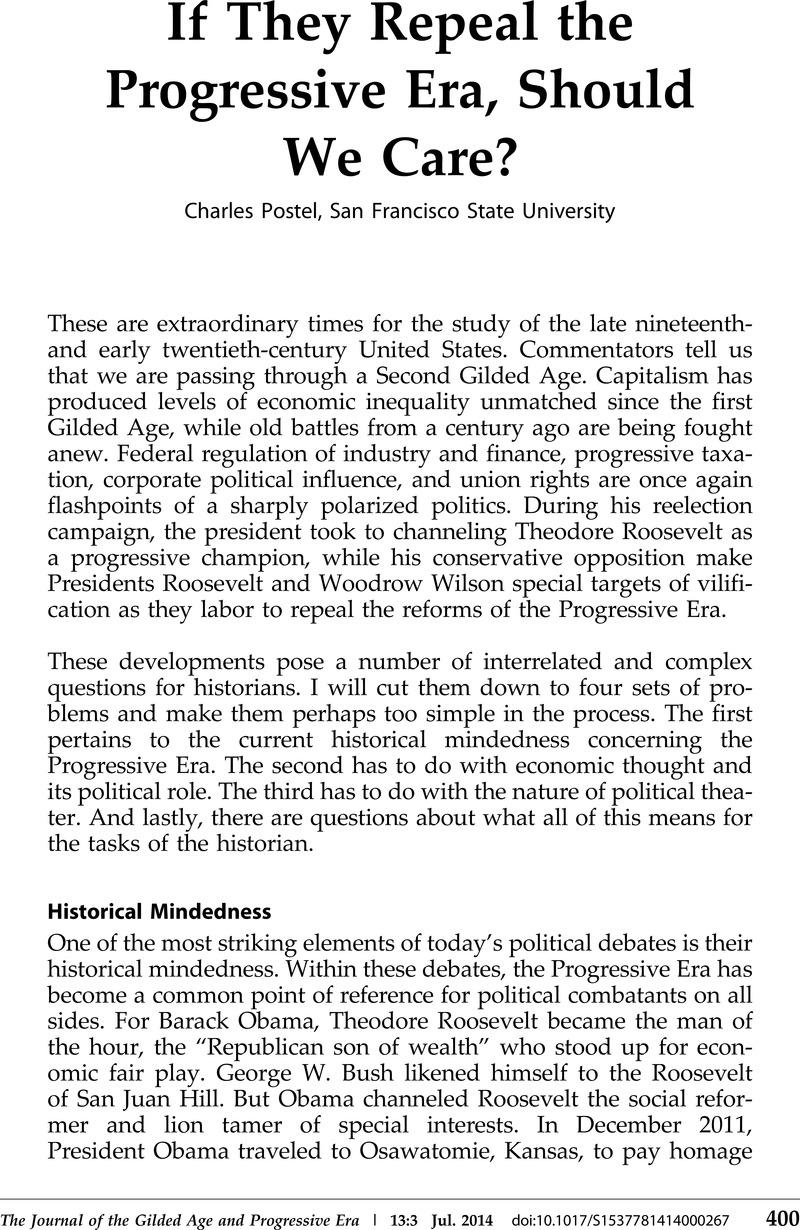Article contents
If They Repeal the Progressive Era, Should We Care?
Published online by Cambridge University Press: 15 July 2014
Abstract

- Type
- Forum: Populists and Progressives, Capitalism and Democracy
- Information
- Copyright
- Copyright © Society for Historians of the Gilded Age and Progressive Era 2014
References
1 “Remarks by the President on the Economy in Osawatomie, Kansas, Dec. 6, 2011, www.whitehouse.gov/the-press-office/2011/12/06/remarks-president-economy-osawatomie-kansas (accessed Jan. 7, 2014).
2 “Little Change in Public's Response to ‘Capitalism,’ ‘Socialism,’” Pew Research Center for the People & the Press, Dec. 28, 2011, www.people-press.org/2011/12/28/little-change-in-publics-response-to-capitalism-socialism/ (accessed Jan. 7, 2014).
3 Sarah Palin, “Glenn Beck” in “The 2010 Time 100,” Time, April 29, 2010.
4 Skousen, W. Cleon, The Naked Communist (Salt Lake City, 1962)Google Scholar.
5 Skousen, W. Cleon, The Communist Attack on the John Birch Society (Salt Lake City, 1963)Google Scholar.
6 Skousen, W. Cleon, “12th Principle: Advantages of a Republic” in Skousen, The Five Thousand Year Leap: 28 Great Ideas That Changed the World, foreword by Glenn Beck (1981; Franklin, TN, 2009), 113–18Google Scholar.
7 Perry, Rick, “The Progressive Era: Remaking the Constitution with the Sixteenth and Seventeenth Amendments” in Perry, Fed Up! Our Fight to Save America from Washington (New York, 2010), 39Google Scholar.
8 Gordon, Linda, “If the Progressives Were Advising Us Today, Should We Listen?” Journal of the Gilded Age and Progressive Era 1 (Apr. 2002): 109–21CrossRefGoogle Scholar.
9 For this usage of “corporate liberalism,” see Lustig, R. Jeffrey, Corporate Liberalism: The Origins of Modern American Political Theory, 1890–1920 (Berkeley, 1982)Google Scholar.
10 Williams, R. Hal, Realigning America: McKinley, Bryan, and the Remarkable Election of 1896 (Lawrence, KS, 2010), 91, 128Google Scholar; O'Malley, Michael, “Free Silver and the Constitution of Man,” Common-Place 6 (Apr. 2006)Google Scholar, www.common-place.org; Walker, Francis A., Money in Its Relation to Trade and Industry (New York, 1889), 243Google Scholar.
11 Benko, Ralph, “The Gold Standard: A Litmus Test for GOP Candidates,” Forbes, July 5, 2011Google Scholar.
12 Friedman, Milton, “Bimetallism Revisited,” Journal of Economic Perspectives 4 (Fall 1990): 85–104CrossRefGoogle Scholar.
13 Rauchway, Eric, “TR? Obama's More Like Taft,” Politico, Dec. 7, 2011Google Scholar, www.politico.com.
14 Kolko, Gabriel, “Roosevelt and Big Business,” in Kolko, The Triumph of Conservatism: A Reinterpretation of American History, 1900–1916 (New York, 1963), 113–38Google Scholar.
15 Theodore Roosevelt, “New Nationalism,” Aug. 31, 1910, teachingamericanhistory.org/library/document/new-nationalism-speech (accessed Jan. 7, 2014).
16 Lepore, Jill, The Whites of Their Eyes: The Tea Party's Revolution and the Battle over American History (Princeton, 2010)Google Scholar.
17 Gordon S. Wood, “No Thanks for the Memories,” New York Review of Books, Jan. 13, 2011.
- 1
- Cited by




